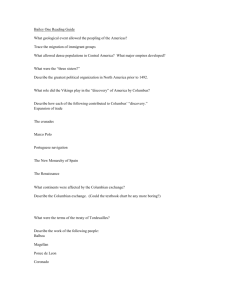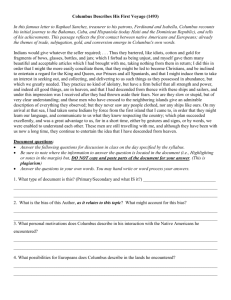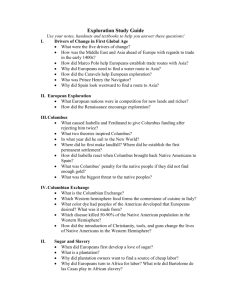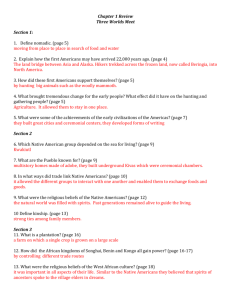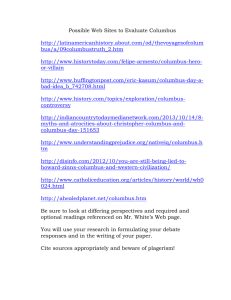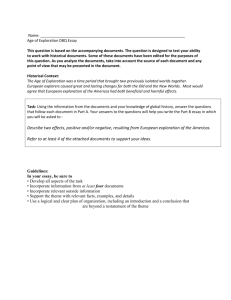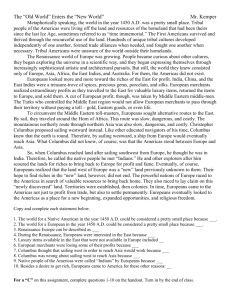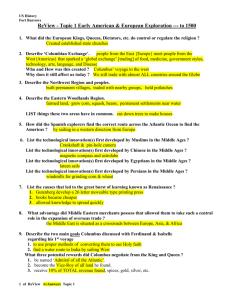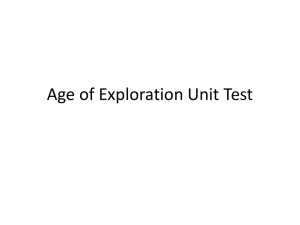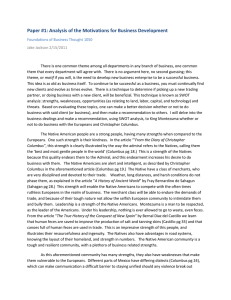Columbus Lesson
advertisement
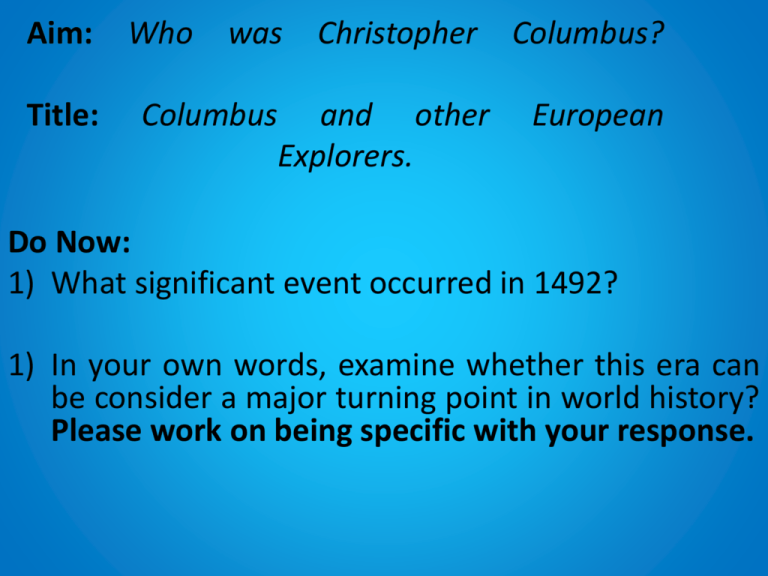
Aim: Title: Who was Christopher Columbus and other Explorers. Columbus? European Do Now: 1) What significant event occurred in 1492? 1) In your own words, examine whether this era can be consider a major turning point in world history? Please work on being specific with your response. Today’s Learning Objectives: • Identify the three stated aims of Columbus' voyages: God [Christianity], Gold [bullion: silver & gold], & Glory [exploration/chance to see the world/discover new things/places – get away from the boring manor]. • Describe the native people Europeans encountered and the results of their contact. • Compare the goals of early European exploration with the results. Silk Road towns connected the largest cities of the West and East in 100 CE. West East In 1492, who controlled the land route to the Eastern spices? West East Activity #1 1. Complete the listed handout with your group members. Reviewing the handout pertaining to today’s activity Prior to Columbus’ “Discovery” Post-Columbus’ “Discovery” Europeans as were interested in distant lands, i.e., India/Asia. Native peoples were tortured, killed, and placed into slavery. Many different Native tribes occupied what was later called the “Americas” = Amerigo Vespucci [Italian cartographer/navigator]. The Atlantic slave trade began. In the aftermath , Protestant Reformation, many Europeans wanted to leave Europe to seek a safer place to worship their religion. Most of the “Natives” were at peace. More explorers began “discovering” parts of the Americas. Europeans experienced hard times in early stages of starting colonies. Europeans had a “3 G” mindset: God, Gold, and Glory. Life in Europe & the Americas prior Life in Europe & the Americas post Columbus’ “Discovery” Columbus’ “Discovery” No Europeans in the Americas Conquest/Imperialism = land, No horses, cows and various other bullion, and various large animals normally used for goods/products. transportation, etc. European monarchs/lords became “Natives” populated the Americas: richer by using Mercantilism Tainos, Caribs, Arawaks, Incas, Growth of unity/nationalism Aztecs, etc. throughout Western Europe. Many different empires Slavery: Natives & Africans • Structured gov’ts/political systems. Genocide: Mass killing of Natives • Math & astronomy developed – by way of diseases and new advanced societies weaponry. • Written languages Better/healthy diets – especially for Various grandiose monuments, i.e., Europeans by way of the pyramids, pillars, etc. Columbian Exchange = various Developed complex societies & new foods: corn, peppers, peanuts, trade developed tomatoes, cocoa, medicines, etc. Well defined/developed Saw the introduction of various culture/religion. new diseases = rapid death of the Were able to measure time – with a Native people. very accurate calendar, one in New cultures (religions – which many people believe may Christianity), languages, building come to pass in less than two structures, laws, customs, etc. months [December 2012]. Activity #2: Questions/comments? 1. The HW a. Key historical terms/phrases. b. Since you will definitely see them again, did everyone find the definitions & significance of each? • Part Two: Define and give the significance of each term below: 1) Middle Passage 2) Treaty of Tordessillas 3) Prince Henry 4) Encomienda System 5) Encounter 6) Columbian Exchange 7) Amerigo Vespucci New Colonial Rivals “Triangular” trade made some continents wealthy while it impoverished other continents. Middle Passage • Middle Passage – Definition: second leg of the triangular trade network which transported slaves to the Americas • Slave Ship Video • • • • • Loose-packers vs. Tight-packers Environment slaves were held in Resistance Statistics of survival Names of slave ships and the irony Prince Henry, the Navigator School for Navigation, 1419 The “Columbian Exchange” Squash Avocado Peppers Sweet Potatoes Turkey Pumpkin Tobacco Quinine Cocoa Pineapple Cassava POTATO Peanut TOMATO Vanilla MAIZE Syphilis Trinkets Liquor GUNS Olive COFFEE BEAN Banana Rice Onion Turnip Honeybee Barley Grape Peach SUGAR CANE Oats Citrus Fruits Pear Wheat HORSE Cattle Sheep Pigs Smallpox Flu Typhus Measles Malaria Diptheria Whooping Cough Native American Labor • Encomienda system – Right to demand labor or tribute from Native Americans – Used for plantation and mining labor – Conditions • Disease, starvation and cruelty (pop. Decline) • Those who resisted were often killed Administration of the Spanish Empire in the New World 1. Encomienda or forced labor. 2. Council of the Indies. Viceroy. New Spain and Peru. 3. Papal agreement. The Treaty of Tordesillas, 1494 & The Pope’s Line of Demarcation Activity #3: Discussing Columbus • Discussion on last week’s homework pertaining to Columbus. Who was he? – Everyone must have his or her homework in front of him or her in anticipation of partaking in this discussion. • What questions did you formulate on your own? As per the homework, all were asked to bring forth a minimum of three (3) queries pertaining to Columbus, European explorers, and the era/period in question. Activity #4: Videos centered on Columbus: • Watch a few videos surrounding Columbus, his explorations and its rippling effects/ramifications dating back to the late 15th century to this very date. Return Students “Revival of Trade” Essay What I noticed while grading the papers: 1. Various instances of plagiarism. a. There’s a very thin between your own work & plagiarism. 2. Students failed to follow simple instructions as per the rubric & various lessons. a. What happened to your thesis statement? Underline it. b. As mentioned countless times, in historiography (writing history), unless advised to do otherwise (which you were not) students must write in the 3rd person, and not the 1st or 2nd. 3. Too many errors (really frustrating at times): grammatical, factual, spelling, failure to know when & where to utilize capitalization of various words/terms, etc. 4. Although students were afforded countless in-class time to conduct their work, many of the essays in which I read appeared like they were conducted last minute with no or very little revision/editing. Good News! With that said, I cannot/will not paint everyone with a broad brush, for there were a few essays that did impress me in a myriad of ways. Some, while not perfect (oh please, I too make my share of errors), but learned and definitely showed tremendous growth in the process. While I will not single you out here, based on your committed hard work, my comments, etc., you ought to know who you are by now. Questions/Comments? Please bring it to my attention during lunch period, or anytime after 4:05 pm Tuesday, Wednesday, Friday in this very room – 311. Homework# 25 • 1. Read 16.3 – Please read it! • 2. Create (write it out) an original song, poem, rap, etc., surrounding/focused on how Europeans treated “others”: Non-Europeans = native & Africans. • Unless you want to listen to Jason’s “boring” Rastafarian (i.e., Bob Marley, Peter Tosh, Steele Pulse, etc.) music (LOL), come to class with some music focused on oppression (slavery, discrimination: color, race, ethnicity, religion, gender, etc.) by one group over another. We will play/blast [BUMP] some music surrounding oppression.
